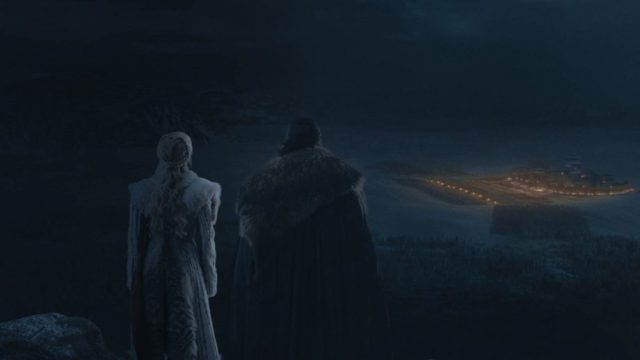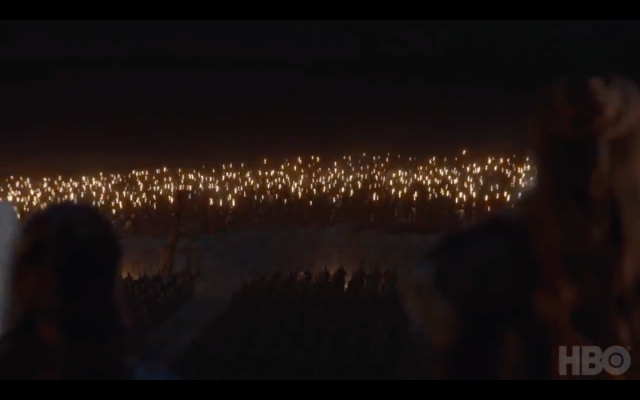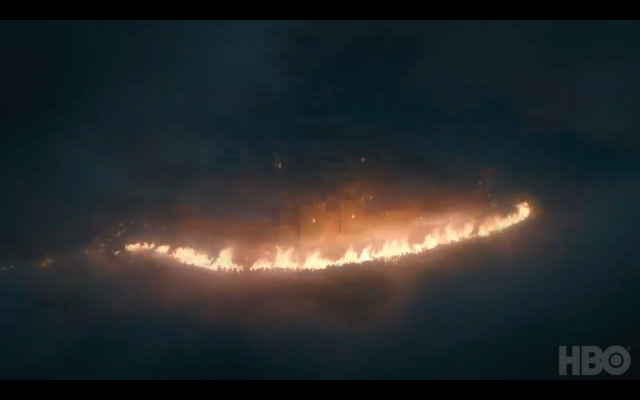-
It's Team Human, led by Jon "Oh, geez, this isn't going well" Snow...HBO
-
Versus Team Undead, led by a formidable tactician who perhaps got a bit too cocky trying to relish the moment as he went for the final prize. Don't get cute on the one-yard line, Night King.
Halfway through the last season of Game of Thrones, we put together an after-action analysis of the major military engagements driving the plot of the series in the season's two central episodes—"The Queen's Justice," in which the forces allied against Queen Cersei got seriously pasted, and "The Spoils of War," in which Daenerys Targaryen, her dragons, and her Dothraki rapid response force swept down on the Lannister army's wagon train and turned it into a macabre cookout.
Now we're halfway through the final season of the series, and we're at a similar pivot point. The second episode of the season—"A Knight of the Seven Kingdoms"—laid out the somewhat awful strategic position of the combined allied forces under the command of Daenerys Targaryen and her Warden of the North, lover and likely nephew Jon Snow. And in the most recent episode—"The Long Night"—that situation reached its climax and conclusion in what could set the record for the least number of photons registered in a film or video production of its length ever.
As we were writing this, we were beaten to the punch by one of our favorite military Twitterati and bloggers, Angry Staff Officer, a master of fictional tactical interpretation, in his excellent but perhaps slightly misguided analysis for our sister publication, Wired. It's definitely worth reading, and you should do so right after you read this—unless you have not seen the episode and are averse to spoilers. In that case, come back and read both once you're ready.
Situational awareness

Dany's Dothraki and Unsullied forces, Jon's army of the North, the remaining Night's Watch, the remnants of the Brotherhood Without Banners, and a sundry assortment of other good guys face a dire strategic situation to start. The Night King and his mega-army of risen dead people have them outnumbered; he can challenge their air superiority with his own undead dragon and proven anti-aircraft spear; and instead of getting reinforcements from the double-dealing Queen Cersei, they get a one-handed man famous for pushing a kid out a window and siring kids with his sister.
At their command post in Winterfell, the collected leaders looked at the bleak situation and laid out their battle strategy: hold out as best as possible while luring the Night King into a single combat situation using warg raven/drone operator and cryptic intelligence provider Bran Stark (that kid who got pushed out the window) as the bait. Then they mostly get drunk and wait for the onslaught, until forward scouts signal that the enemy is near. But other than toots on a horn, Dany's leadership has absolutely no battlefield situational awareness. It's like they don't have any sort of flying thing that could do reconnaissance or something.
While scouts have given a rough estimate of force composition and the order of battle is pretty well-known, there's pretty much no operational picture—and pretty much no television picture, either, as the director of photography chooses to present the first half of the episode mostly in various shades of black. As the battle approaches, flame priestess and general portent of doom Melisandre wanders up and provides some much needed lighting—giving the Dothraki cavalry some flaming swords to swing. Meanwhile, non-combatants are withdrawn to the super-safe crypt, surrounded by dead people who could be raised by the Night King. Nobody seems to think twice about this, not even Dany's supposedly savvy advisors Tyrion and spymaster Varys—but we've seen them fall flat on their faces before in the foresight department, so that's not a shocker.
Dany and Jon watch from a mountaintop vantage point, awaiting their cue to deliver air support. They can't see much of anything. But somebody eventually does, as the Dothraki charge the unseen White Walker line.
Leeroy Jenkins time

There has been a lot of criticism of the Dothraki cavalry charge. But we are here to say that the criticism should be focused on the lack of close air support. In "The Spoils of War," the Dothraki served as a "fixing force" to line the Lannisters up for mass destruction from the air. Here, the Dothraki are literally lighting the way to the enemy, and all they have is some artillery support in the form of catapulted flaming tarballs.
Had this illumination been used for, say, some timely dragon strafing by Dany while Jon flew combat air patrol above, the Dothraki sacrifice may have been considerably smaller. Instead, we just get to see their flaming swords extinguished by the advancing line of we don’t know what.
The primary failure of the Dothrakis' use as a shock force was that they ran into an enemy (literally) that could not be shocked. Hopefully there are enough of them left to play a role in the next engagement.
The Dothraki charge was just another example of how utterly unimaginative Dany's supporting staff have been in the face of new challenges. As the returning Dothraki retreat back to Winterfell, we get a good look at another major failure of imagination—the defensive works around the castle, which are, to be honest, embarrassing even from a medieval tactical perspective. While the defenses may have been rushed a bit, it's hard to believe nobody remembered that the enemy's main body was a relentless, berserker undead infantry. Winterfell's outer defensive works were:
- A line of chevaux-de-frise—spiked anti-cavalry fortifications akin to tank traps
- A trench filled with stuff that burns
That's it. There were no other engineering efforts made. There was no effort to use the moving mass of the Walkers against them, using stake walls or other defensive structures. There could have been concentric trenches. Nope. And the Unsullied and Dothraki and everyone else on the field before Winterfell had to retreat through the defenses, causing higher losses.
Sure, all of this would have taken time and resources. But even a little more effort could have bought more time. Unfortunately, this bit of tactical and strategic fail is often reflected in reality, where commanders go into battles thinking the enemy will just fight them by the rules they already know.
Combined arms… and legs

Command, control, and communication is essential on the battlefield. But the Night King essentially jammed Winterfell's C3 efforts by bringing on a literal fog of war—masking the battlefield with Winter itself. Davos Seaworth waves those flaming sticks to signal to Dany to dragon-flame the trenches alight, but she can't see anything through the low deck. Fortunately (?), Melisandre goes out and does her thing one more time, setting the trench alight.
And then everybody just stands there and watches each other. All the catapults are outside the walls and the trenches. All the archers sit on their hands as the Walkers pause at the wall of flame. Another opportunity to thin the (easily replenished) ranks of the dead.
Meanwhile, Dany and Jon get tangled up in an air-to-air engagement with the Night King, astride his zombie, blue-fire spitting dragon. The Night King has failed to master the use of air power: he could have ignored Jon and Dany and just leveled Winterfell's walls with airstrikes like he did to that Other Wall, but nah. He obviously has no understanding of air-to-air tactics and attempts an attack from below—only to end up entangled with one of his targets. Both the Night King and Jon end up un-dragoned, their reptilian aircraft left to their own devices.
But this is not an apparent problem for the Night King, who has psychic C3 over his minions—and is able to raise all the dead around him as reinforcements. Dany tries to toast the Night King with dragon fire, but it's super-ineffective.
The Night King directs his dead troops to breach the burning barrier in a style reminiscent of World War I trench warfare (or, as Angry Staff Officer put it, "Soviet style")—by throwing their bodies down as a bridge over the obstacle. Suddenly, the lines are not so static. The walls are breached World War Z style by the masses of White Walkers. As the battle rages inside the walls, the Night King strolls into Winterfell with his squad of frozen bros.
The plan… works?
-
Castle Winterfell has seen better days
-
Who thought letting Theon guard the humans' one true honeytrap was a good idea?
Then, there is a lot of dying. Jon finds himself tied down by zombie dragon fire. Dany is defended to the death by Jorah Mormont after her dragon gets weighed down by White Walkers. Theon Greyjoy and a band of archers defend Bran at the bait-point to the end, before Theon is dispatched with his own spear by the Night King. It looks like this is the end… until Game of Thrones' ultimate special warfare operator, Arya Stark, arrives and dispatches the Night King with some really slick Valyrian steel dagger work. The King crumbles, and his minions all collapse. It's like a proton torpedo down the exhaust port. The end.
It's a win, at huge costs—one that considerably weakens Dany's fighting force for the coming battle with Cersei's mercenary reinforcements and fleet. But the win shows that the basic underlying strategy mapped out by the leadership was correct—even if the execution left much to be desired.
In the end, we believe that the Battle of Winterfell played out much as most military conflict does. Success in combat often hinges upon the determination, imagination and ability to adapt and overcome in the face of situations that soldiers haven't trained for. The enemy will not always conform to your tactical paradigm. And fortune favors the bold.
Listing image by HBO
https://arstechnica.com/gaming/2019/04/a-post-action-analysis-of-gots-battle-of-winterfell-through-a-glass-darkly/
2019-04-30 16:05:00Z
52780278583549
Bagikan Berita Ini
















0 Response to "A post-action analysis of GoT's Battle of Winterfell—through a glass, darkly - Ars Technica"
Post a Comment